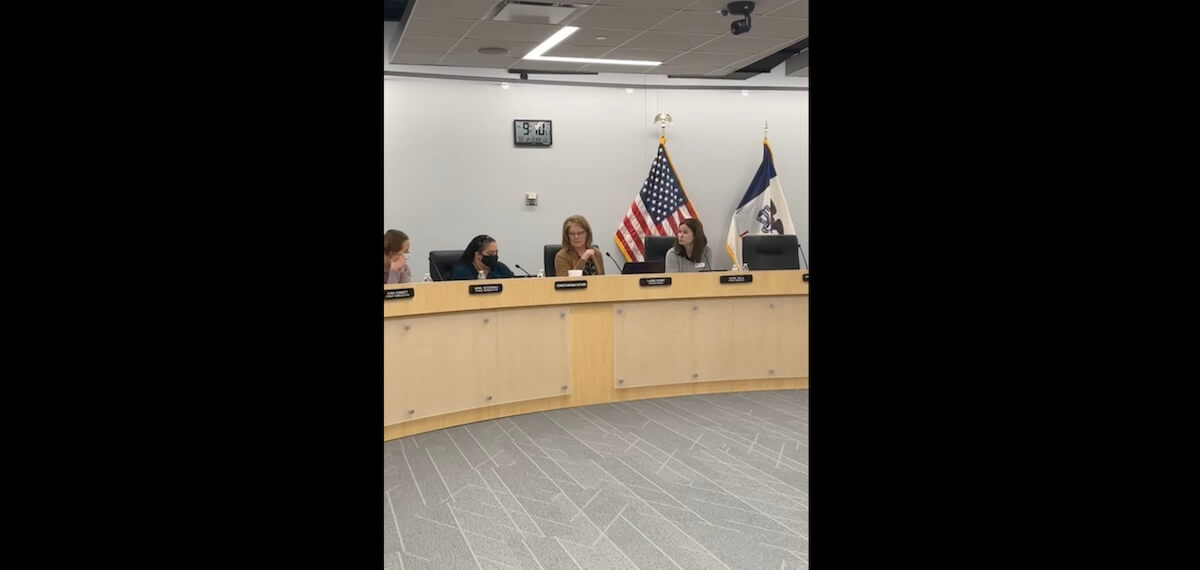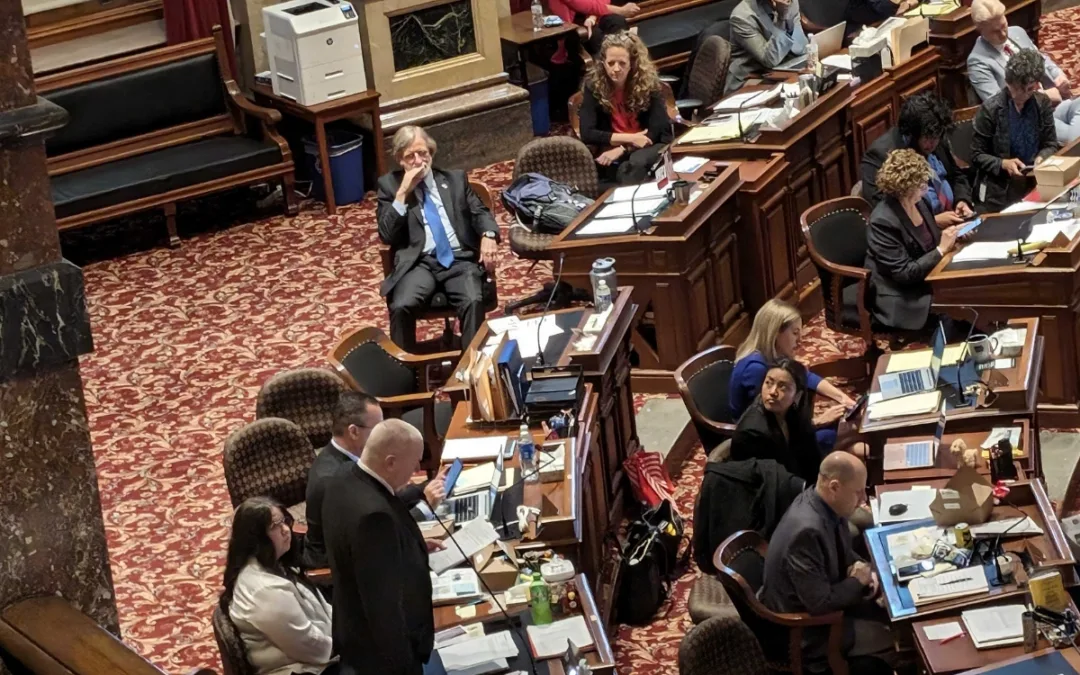
Screenshot from Lya for Johnston Schools Facebook
In the Johnston Community School District, the conversation about diverse books keeps going.
At Monday evening’s school board meeting, the board voted 4-3 to support the recommendation that the challenged book, “The Absolutely True Diary of a Part-Time Indian” by Sherman Alexei,” remain part of the curriculum, provided parents are given the option to choose an alternative book for their student(s).
During the discussion session before the vote, parents opposed to the measure went for shock value to make their point.
When Johnston parent Michele Veach spoke, she used slurs such as the n-word and the f-word, and a few curse words. She also challenged the policy of giving students the opportunity to opt out of required reading with a different book.
“How many students will be willing to do that? My kid should not have to ask for a less offensive book to read,” she said. “Our standards can be and should be higher. Our kids will rise or fall to the moral and academic standards that we set.”
The school board called a recess because audience members objected to the use of slurs, and people who supported Veach’s position tried to defend her use of them.
Veach and other parents who spoke in opposition said they don’t want to ban the books and don’t care if they’re on library shelves. Their argument was that they don’t want them assigned at all, despite the proposal to notify parents ahead of time.
[inline-ad id=”1″]
In November, two parents complained about the books “The Hate U Give” by Angie Thomas and “The Absolutely True Diary of a Part-Time Indian” by Sherman Alexei because of mentions of sex and discussions about race.
A reconsideration committee and the superintendent decided the books should remain on the shelves, but tell parents about potential controversial books ahead of time.
Those parents appealed the decision for “The Absolutely True Diary of a Part-Time Indian.”
The majority of speakers at the meeting supported the board’s earlier decision.
“There have been large amounts of people of color speaking on this topic and expressing our collective belief that these books are essential to the understanding of the lives of people of color lived today,” said Kaylee Jones, a ninth-grader in Johnston Schools. “These books are shedding light on the problems we as people of color live with on a daily basis. When will our community of Johnston listen to our voices?”
[inline-ad id=”2″]
Anne Smith, a district parent, thinks everyone should respect teachers as the professionals when it comes to teaching.
“We do have a tremendous opportunity in front of us I believe. Not just as members of the board but as parents, taxpayers, and the community to show that Johnston is a truly independent school district,” she said. “Independent of the influence of lawmakers, national political action committees, and groups who seek to silence authors of color under the guise of decency.”
The board voted 4-3 to keep the recommendation. The three detractors were newcomers Clint Evans, Deb Davis, and Derek Tidball, who all signed the 1776 pledge before the Nov. 2 election. The pledge was created by the 1776 Action political action committee to stop the alleged indoctrination of America’s schoolchildren.
Tidball argued for more information given to parents than the provided synopses. He suggested warnings about the content parents might find instead of leaving them to learn it themselves.
[inline-ad id=”3″]
Davis continued to argue the book is too obscene for the school because of swear words and mentions of sex.
Board President Katie Fiala said the school is operating based on obscenity definitions coming from the US Supreme Court and state law, which sets the standard that books with controversial material must have “serious literary, artistic, political, or scientific value” to avoid being obscene.
Student representative Jenna Woodsmall said she has a lot of experience in literary courses and having books like this assigned.
“A lot of the books that I do read, some of them may not be as explicit in nature, but a lot of them do deal with these kinds of topics,” she said.
Woodsmall pointed out the crude wording found in Alexei’s book is because of its reading level, which is less advanced than other books.
[inline-ad id=”4″]
“When we look into that wording and we focus in on those sections, it makes it hard to see the work as something of literary value,” she said. “But I think that’s why reading the book, and, as my teacher said, looking at the forest not just the trees, I think that’s important to understanding it as something of literary value.”
“The Absolutely True Diary of a Part-Time Indian” is a novel by a Native author, about a 14-year-old Native boy who lives on a reservation in Washington. It deals with the clash between living in and growing up in poverty, but attending a wealthy, mostly white high school because of the better opportunities. The character, Junior, struggles with his identity, fitting in in two different places and handling the obstacles of being a minority and of life on a reservation.
The author has said the book is semi-autobiographical.
by Nikoel Hytrek
Posted 12/15/21
[inline-ad id=”0″]
Politics

AEAs cutting workers in wake of Republican legislation
Iowa legislators said a new bill cutting money for agencies that help students with disabilities wouldn't affect services. But area education...

He said what? 10 things to know about RFK Jr.
The Kennedy family has long been considered “Democratic royalty.” But Robert F. Kennedy, Jr.—son of Robert F. Kennedy, who was assassinated while...
Local News

No more Kum & Go? New owner Maverik of Utah retiring famous brand
Will Kum & Go have come and gone by next year? One new report claims that's the plan by the store's new owners. The Iowa-based convenience store...

Here’s a recap of the biggest headlines Iowa celebs made In 2023
For these famous Iowans, 2023 was a year of controversy, career highlights, and full-circle moments. Here’s how 2023 went for the following Iowans:...





